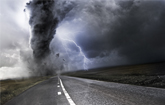Storms and Power Outages Can Increase Poisoning Risk says The Poison Control Center at Children's Hospital of Philadelphia
Carbon Monoxide (CO) Poisoning Symptoms Can Also Mimic COVID-19 or the Flu
PHILADELPHIA, Sept. 2, 2021 /PRNewswire/ -- The Poison Control Center at Children's Hospital of Philadelphia (CHOP) reminds the Greater Philadelphia Region about the dangers of carbon monoxide (CO) – a compound that is especially dangerous after weather emergencies – during power outages.
Severe storms can knock down power lines, and with the accompanying power outages, CO poisoning may be caused by improper use of gas-powered generators inside of or too close to homes.
Widespread outages post-Hurricane Ida have caused some Louisiana families to turn to portable generators for power. According to news reports, 12 people (children and adults) from the same household were tragically poisoned after running a generator in their garage. Similar incidents could occur in the Philadelphia region if precautions are not taken.
Often called the "silent killer," CO is odorless, tasteless, colorless—and very toxic. It can be produced when any appliance that burns wood or fuel (oil, gas, propane, kerosene, coal) is malfunctioning or poorly vented.
CO poisoning symptoms are often mistaken for flu, and this year, they could also be mistaken for symptoms related to COVID-19. The Centers for Disease Control (CDC) yesterday alerted health care providers to recognize the symptoms of CO poisoning, which include headache, nausea, sleepiness, dizziness, and confusion, and in severe cases can cause coma, heart attack, and death. CO may be the culprit if symptoms occur shortly after using a furnace or generator, if multiple family members become sick at the same time, or if symptoms improve when outside of a home or building.
In addition, the CDC offers guidance to the public on CO poisoning and its prevention at its CO website: https://www.cdc.gov/co/default.htm
There are ways to make sure that CO does not cause problems in your home:
- During power outages, only use gasoline-powered generators outdoors, away from vents or windows, and at least 20 feet from the house.
- Install CO monitors in your home and make sure all monitors have new, working batteries.
- Don't use gas ovens to heat your home.
- Never use barbecue grills or gasoline-powered equipment indoors or in a garage.
If you think CO is in your home, open doors and windows to air out the house, turn off the heating system, and call 911 or your heating company.
If you have any symptoms and you suspect CO poisoning, leave the area immediately and contact The Poison Control Center or 911.
The Poison Control Center's toll-free 24-hour hotline is 1-800-222-1222.
About Children's Hospital of Philadelphia: Children's Hospital of Philadelphia was founded in 1855 as the nation's first pediatric hospital. Through its long-standing commitment to providing exceptional patient care, training new generations of pediatric healthcare professionals, and pioneering major research initiatives, Children's Hospital has fostered many discoveries that have benefited children worldwide. Its pediatric research program is among the largest in the country. In addition, its unique family-centered care and public service programs have brought the 595-bed hospital recognition as a leading advocate for children and adolescents. For more information, visit http://www.chop.edu
Contact: Joey McCool Ryan
(267) 258-6735
[email protected]
SOURCE Children's Hospital of Philadelphia

Related Links
WANT YOUR COMPANY'S NEWS FEATURED ON PRNEWSWIRE.COM?
Newsrooms &
Influencers
Digital Media
Outlets
Journalists
Opted In





Share this article